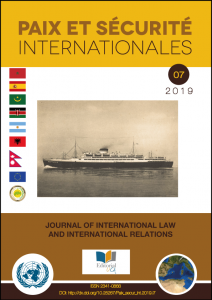
Campins Eritja, M. “Transboundary water management in Central Asia and its implications on regional security”, Paix et Sécurité Internationales. Journal of International Law and International Relations, núm. 7, 2019.
This paper draws from the situation of imbalance in the use of water resources among the Central Asian States, in a context marked by a deep dichotomy between two competing uses of water -irrigation and the production of hydroelectric energy. From the perspective of water resources management, the hydrographic and geopolitical complexity of the region is unquestionable and has been found in the cause of several interstate conflicts, which are frequently aggravated by important environmental challenges.
From there, this paper discusses the adequacy of the international regulatory framework to guarantee the sustainable governance of water resources in the region. The impact of multilateral conventions in the region is analysed, as well as the development of a series of bilateral agreements that have actually maintained the status quo. This situation has worsened due to the low consistency and effectiveness of the regional institutions created by these same agreements. From a regional perspective, the situation in the countries of Central Asia offers an exceptional case for analysis. It is an area with significant security risks due to the widespread lack of governance over the use of water resources, which are unevenly distributed between the Central Asian States, and have undergone alarming environmental degradation in recent years. Although this situation could represent a major opportunity for the development of interstate cooperation, the upshot will depend to a large extent on the capacity of political institutions in the region to manage these resources in a way that is both environmentally and politically sustainable.
